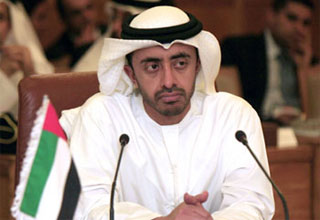
Abu Dhabi, April 13: The UAE on Thursday recalled its ambassador to Iran for consultations, a day after Foreign Minister Shaikh Abdullah bin Zayed Al Nahyan condemned a visit by Iranian President Mahmoud Ahmadinejad to the UAE’s island of Abu Mousa, occupied by Teheran since 1971.
‘The Ministry of Foreign Affairs summoned today UAE Ambassador to the Islamic Republic of Iran Saif Mohammed Obaid Al Zaabi for consultations,’ a statement said as the latest Iranian provocation drew a chorus of condemnation. The UAE also cancelled a football friendly against Iran scheduled for April 17, at the Fujairah Stadium.
A statement from Yousuf Yaqoub Al Serkal, chairman of the interim committee of the UAE Football Association, said the decision comes in line with the UAE’s denunciation of Ahmedinajad’s visit.
GCC Secretary-General Dr Abdul Latif Al Zayani lambasted Ahmadinejad’s visit to the occupied islands as ‘provocative’ and a ‘flagrant violation’ of the UAE’s sovereignty.
The visit, he stressed, would not change the historic and legal facts and UAE sovereignty over its three occupied islands the Greater and Lesser Tunbs and Abu Mousa.
‘The visit demonstrates an irresponsible provocation and a step that doesn’t cope with the good neighbourliness policy adopted by GCC member states towards Iran nor with the GCC’s persistent peaceful efforts for solving the issues either through direct negotiations or taking the case to the International Court of Justice,’ he said.
The UAE Federal National Council (FNC) said in a statement that the ‘visit is a flagrant violation to the UAE sovereignty over its territories, and a setback to all efforts made by the UAE to put an end to the occupation of the UAE Islands through direct negotiations or resorting to the International Court of Justice’.
The FNC underscored that the visit is contrary to what has been agreed on between the two countries to avoid an escalation over the issue and to create a conducive atmosphere for reaching settlement that consolidates security, stability and good-neighbourliness.
The FNC slammed the provocative rhetoric of the Iranian president during his infamous visit to the UAE territory, calling on Teheran to cease such provocative steps and adopt peaceful approaches that could build confidence and help reach a just settlement to the issue.Foreign Minister Shaikh Abdullah had on Wednesday condemned the visit in the strongest possible terms, terming it as a ‘flagrant violation’ of the UAE sovereignty and a ‘setback’ to all efforts and attempts the UAE has been making to find a peaceful settlement to Iran’s occupation of the UAE islands.
‘This visit will not change the legal status of these islands which are part and parcel of the UAE national soil,’ Shaikh Abdullah emphasised.
He asserted that the visit and the provocative rhetoric of the Iranian president exposed Iran’s false allegations regarding its keenness to establish good-neighbourliness and friendship with the UAE and countries of the region.
The UAE foreign minister denounced the timing of the visit, saying it comes at a time when the two countries agreed to make more efforts to turn over the page by reaching a solution to the issue, and at a time the UAE has committed to what both countries had agreed out of a desire to create a conducive environment for reaching a solution that enhances stability in the region.
Ahmadinejad’s visit, Shaikh Abdullahhe said, was a gross breach of this agreement.





Comments
Add new comment